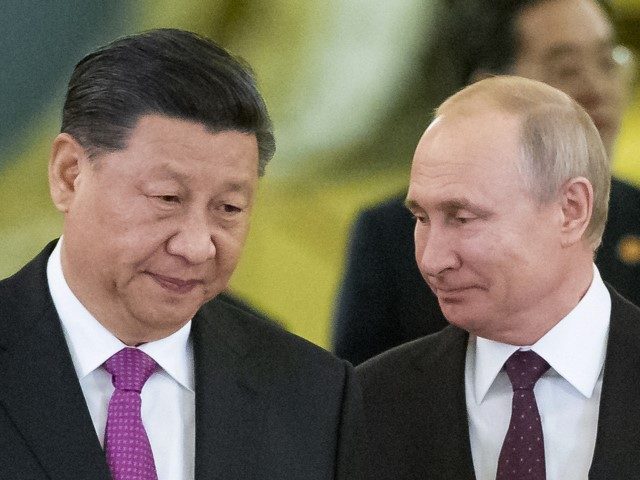Chinese dictator Xi Jinping called his Russian counterpart Vladimir Putin and urged him to resolve the war with Ukraine that he started on Thursday “through negotiation,” emphasizing that China supported “respecting the sovereignty and territorial integrity of all countries.”
Xi’s call to Putin followed a second day of heavy clashes between Ukrainian and Russian forces, as well as widespread reports of Putin ordering the bombing of civilian targets like kindergartens and hospitals. Following the call, the Kremlin announced that it was open to negotiations with Ukraine, an apparent change in tone after Kremlin spokesman Dmitry Peskov said on Thursday Russia was ready to negotiate only “terms of surrender.”
Putin announced he would invade Ukraine on Thursday morning, calling the operation a “denazification” of the country. Putin and his regime have repeatedly referred to the government of Ukrainian President Volodymyr Zelensky, who is Jewish and the descendant of World War II veterans, as Nazis. Putin also declared in a speech on Monday prior to the attack that Ukraine “was completely created by Russia” and had no right to sovereignty.
Putin first invaded Ukraine in 2014; the current escalation continues a war that is already eight years old. Russian forces have illegally occupied Ukraine’s Crimean peninsula since 2014 and fueled a war with pro-Russian separatists in the Donbas region since that year.
Xi Jinping reportedly called Putin after the Russian military appeared to fail to make any significant progress on Thursday. The Russians announced two victories, both not occurring in any major population centers: the takeover of the defunct Chernobyl Nuclear Power Plant and the defeat of 13 Ukrainian soldiers on a small Black Sea territory known as Snake Island.
“China supports Russia and Ukraine to resolve the issue through negotiation. China’s basic position on respecting the sovereignty and territorial integrity of all countries and abiding by the purposes and principles of the UN Charter is consistent, Xi told Putin,” according to China’s Global Times state newspaper.
The newspaper cited Xi as telling Putin, “China decides its position based on facts. The Cold War mentality should be abandoned, concerns of all parties should be respected, and the Ukraine issue should be solved through negotiations, to form a balanced, effective and sustainable security mechanism.”
The Global Times claimed that Putin responded by claiming that America had “long ignored Russia’s security concerns” but that “Russia is willing to conduct talks with Ukraine.”
Peskov appeared to reflect this change in tone in remarks to reporters on Friday.
“In response to Ukrainian President Volodymyr Zelensky’s request we’re ready to send representatives of the Russian Foreign Ministry and presidential administration for negotiations,” Peskov said, according to the Russian state news site Sputnik.
On Thursday, Peskov claimed that Putin was prepared for “discussions” with Zelensky, but only regarding “surrender.”
“According to Peskov, Russian President Vladimir Putin has expressed his preparedness to engage in discussions with his Ukrainian counterpart, with a focus on obtaining a guarantee of neutral status and the promise of no weapons on its territory,” the Russian propaganda outlet RT reported. “These are terms that, according to Peskov, would enable the achievement of the demilitarization and denazification of Ukraine, and eliminate what Russia currently views as a threat to the security of its state and people.”
China and Russia are typically closely aligned geopolitically. China has pointedly decided to abstain from supporting the major initiative that led Putin to initiate the current military operation, however: recognizing the two territories in Donbas, Donetsk and Luhansk, as sovereign states. Putin claims his invasion is legitimate because the leaders of the “Donetsk People’s Republic” and “Luhansk People’s Republic,” which he considers sovereign, requested Russian military aid against Ukraine’s “genocide” of people in that region. No evidence at press time indicates that the Ukrainian government is engaging in genocidal acts in Donbas, according to human rights organizations.
The Chinese Communist Party has a blanket policy of not recognizing any separatist movements anywhere in the world, and that extends to not recognizing legitimate sovereign states if another state makes a spurious claim over them. Beijing has long insisted that Taiwan – a sovereign, democratic state with no history of ever being governed by Beijing – is a rogue Chinese “province,” and rejects recognizing disputed states for the sake of consistency. During a press briefing on Wednesday, Chinese Foreign Ministry spokeswoman Hua Chunying effusively stated, “Taiwan is for sure not Ukraine,” appearing to reject Putin’s claims that Ukraine has no “tradition” of being a sovereign state.
Hua made a nearly identical argument for folding Taiwan into China as Putin’s for annexing Ukraine, while insisting that Ukraine’s situation was different – meaning Ukraine was, unlike Taiwan, a sovereign entity in the eyes of the Communist Party.
“Taiwan has always been an inalienable part of China’s territory. This is an indisputable historical and legal fact,” Hua said. “The one-China principle [the idea that Taiwan is a province of China] is a universally recognized norm governing international relations. The Taiwan region’s peace hinges on the peaceful development of cross-Strait relations, rather than brownnosing foreign forces for arms sales and military support.”
On Thursday, Hua appeared to again reject Putin’s behavior, asserting, “China opposes any act of inciting war and has taken a responsible attitude from the very beginning to persuade all parties not to escalate tensions and incite war,” according to the state Xinhua News Agency.
“At that time, if all the parties had promoted peace talks, reviewed the historical context of the Ukraine issue, respected and accommodated each other’s security concerns, and resolved the issue in a reasonable, proper way for a soft landing of the situation, what would be happening now?” Hua asked.

COMMENTS
Please let us know if you're having issues with commenting.